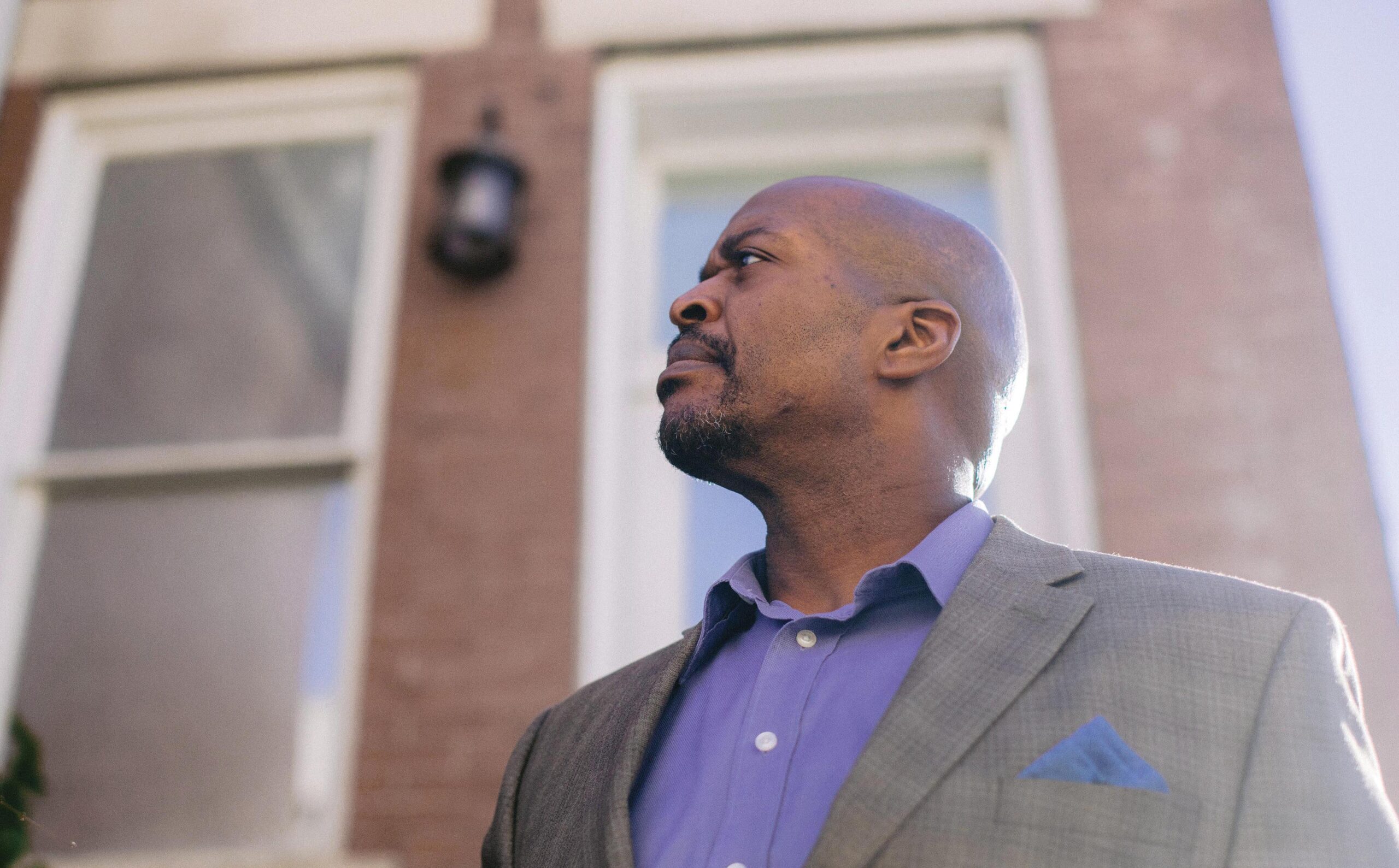By 1994, Jeff Wright had everything. He’d just become head of mergers and acquisitions for Bristol-Myers Squibb. He lived in the suburbs of New York on an expansive piece of real estate like the families in 90’s sitcoms. The Wright children attended an uppity, elite private school, and you could quantify his life’s work with a vault’s worth of stock options. Ask and he’ll tell you he was the guy who had it all, right down the successful businessman checklist.
A few years before, a friend showed him a movie called Making it … Thru the Cracks. It’s a story about two friends who grow up in an inner city. The film follows their lives, and, by the end, one friend becomes a cocaine dealer and the other one gets his first royalty check for writing a Christian rap song. This was the late 80s, right on the cusp of Grandmaster Flash and the Furious Five, and well before rap music went mainstream. And to Wright, a Christian rap song was “just mind blowing.”
The affecting part wasn’t necessarily the Christian part. Wright grew up as the grandson of a CME pastor and the son of Sunday school superintendent. And the influence of his mother is well documented. At 8 years old, she was run over by a train, a tragic accident that left her with no arm or leg on the left side of her body. She not only survived, but she went on to get married, earn advanced degrees in library science, and become the head librarian for the city of Washington D.C. — all while raising seven sons. As Wright will tell you — and as told in the 2000 book Sacred Bond: Black Men and Their Mothers — this shaped Wright’s own work ethic and faith indelibly. And it meant he came up in a world where opportunities could be seized, goals could be accomplished.
Which is why Thru the Cracks struck him: It was a Christian effort to put the Christian message in a new and contextualized place. And Wright wanted to get involved — to fund, to help market, to something — with whoever made the movie. “I turned that cassette over to the back, memorized the number — (312)-233-4499 — and I went home, called them up, and said, ‘I’d like to speak to the president.’ And he answered.”
A Message and a People
Today, Urban Ministries Inc. is the largest of the few independent Black-owned and -operated Christian media companies. UMI publishes resources like Bible studies and church curriculum (think everything from VBS programs to study Bibles) written for Black churches and Black Christians. Since its founding in 1970, UMI has, according to its own numbers, resourced more than 40,000 churches and reached an estimated 10 million people.
“While other evangelical companies have tried with varying degrees of effort and success to reach beyond their core white evangelical consumer base, UMI has stood out among prominent evangelical publishing companies in treating Black evangelicals as an important constituency within a broader evangelical community,” said Daniel Vaca during an email exchange. He’s a professor at Brown University and author of Evangelicals Incorporated: Books and the Business of Religion in America. “UMI also has stood out by continuing to focus on serving churches. Whereas larger companies have tended to focus over time on selling products to individual consumers through mainstream consumer channels — including bookstores and, more recently, online stores such as Amazon — UMI has continued to focus on educating and equipping local church communities through its mission and its products.”
You could hardly overstate the significance of UMI’s sustained success. The publishing company came to life toward the end of the Civil Rights Movement, officially launching just two years after the assassination of Martin Luther King Jr. and the same year John M. Perkins was beaten by police in Brandon, Mississippi. It was a time heavy with need among Black Christians and yet one hardly fertile for Black entrepreneurship, particularly one dependent on a largely Black market. But the focus Vaca references kept UMI pushing its mission, which flows directly from founder Melvin Banks.
Banks fits in line with other 20th-century evangelical luminaries. Like Billy Graham and Jim Elliot, he graduated from Wheaton College (twice), and like them he pursued a calling with life-exhausting, singular passion. He is a man tightly committed to a message and to a people.
Banks grew up in Birmingham, Alabama. After a move to a nearby suburb, he began attending a church where he heard the gospel and became a Christian at nine years old. Just a few years later, the same Sunday school teacher who asked him, “Are you saved?” took Banks to the outskirts of Birmingham to do evangelism. So, at 12 years old, Banks was sharing his testimony in public. The first time, a man approached him afterwards and quoted Hosea 4:6, which says that “my people are destroyed for a lack of knowledge.”
Banks didn’t know this was a Bible verse, but it struck him enough to tell the Lord that if knowledge of his Word was important for the community, then he wanted to do that work.
“I determined that I was going to dedicate my life to that,” Banks said in a recent interview. “That was sort of a genesis of my mission. It turned out that getting God’s Word out to our people would be what I would give myself to.”
In college, Banks saw a lack of discipleship materials accessible to and for the African-American church. While there was “good emphasis on Bible interpretation, there did not seem to be an adequate emphasis on the horizontal responsibility of Christians to meet the needs of people outside of the established tradition of getting them ready for Heaven.” Banks wanted that to change.
That was 50 years ago this fall. And, as Vaca notes, “today, [UMI’s] focus on community seems more important than ever.”
He started UMI to fill the gap, helping people “know we are addressing their issues and we stand for justice and righteousness, and God is calling them to live in a way that they can make a difference in the world,” he said.
And at the beginning, that included Christian movies, like Making It … Thru the Cracks.
‘The Boldest, Craziest Move I’ve Ever Made”
The person Wright connected with was, of course, Melvin Banks.
At the time, 1995, Wright was working on a deal that took him to Chicago. He drove to the South Side to see the company that produced the Black Christian movie. When Banks and Wright met, he asked Wright to do consulting for him. So he did. Then, Banks said, “Why don’t you join my board?” So he joined the board.
Then Banks asked Wright to consider becoming UMI president, to join UMI in a capacity more official than a board member. Twice he asked, with Wright turning him down both times. But what Banks didn’t realize at the time was that for a number of years, Wright had been struggling with what he describes a “ministry call,” a sense that God wanted him to serve the kingdom in a more concentrated way. But that connection certainly wasn’t lost on Wright.
“I did not have a really formed theology of work at that time,” he said. “Certainly, the faith and work movement didn’t exist, or it certainly had no visibility in my world. So I interpreted my ministry call as a call to be a pastor.”
But the ramp Banks offered to be a part of the work at UMI seemed to make sense of his skill set and experience and this call of God: “It hit me that maybe this call was about helping this business,” he said. “That was kind of an aha moment for me. I realized what they needed, I already had.”
Wright’s dad died in April of 1994, just as Wright received the promotion at Bristol-Myers Squibb. He sat at the peak of his career, a perch he’d spent his life trying to get. But with the loss of his dad, he began thinking more about his dad’s own legacy, about the legacy he himself wanted to leave behind.
“I had just been promoted to vice president of business development for what was then a Fortune 50 company. I was thinking, ‘I’m probably the highest African American in the position, touching money in the pharmaceutical industry and the consumer products industry. I’ve been there 10 years, and here is this company that’s making a difference. It’s obviously very small, a few million in sales, but making a difference in the lives of people in thousands of churches. Would this be a higher and greater use of my business skills?’”
He was almost 20 years into his career. Established. And he had a lot of money vested in options — money that, if he changed course, he’d lose. But he said this seemed like the kind of transition God was leading him to in order to use his skills.
“This is in hindsight, but I began to think much more seriously about the significance and contribution and impact of my life when my dad passed. I began to think a little more intentionally about kingdom impact.”
And then Banks asked Wright the question again. And this time he just asked Wright to pray about it. And Wright determined that, yes, this was what God wanted him to do.
With the decision made, it changed almost everything about his life: “I took one last ride in the limo to the helicopter to the corporate jet, and checked out of Park Avenue. Everybody thought I was crazy. I went and worked in that storefront. I have to say — especially now looking back on it 25 years later — that was definitely the boldest, craziest move I’ve ever made in my life. It was definitely a God move, and the Lord blessed it dramatically, but not before chaos and crisis.”
At the time, UMI needed a shift and new energy from new leadership. Banks wanted to hand it over to Wright, but that still meant learning, and learning a lot. Wright spent the first year working every position, trying to understand the business, and leaned on Banks a lot.
The American Church’s Joseph Moment
The Lord blessed the business dramatically. By the mid-2000s, UMI had become firmly established as the largest supplier of Christian education resources at Black churches. That’s thanks in part to Banks’ foresight and Wright’s own experience.
“Where I came from in the corporate world, the media giants 30 years ago began to see the centrality of content being king and platform being ancillary,” Wright said. “In a great feat of — let’s call it unconscious competence — that’s how Banks was thinking the whole way. And that would define the DNA of UMI.”
This means that UMI never pigeon-holed itself into one thing, not just books, not just video. The message and the people couldn’t change, everything could. It’s what industry folks refer to as platform agnostic. And this is where Wright gets excited. He sees the successes of UMI as significant and the upcoming 50th anniversary as an achievement on its own. But he also has in mind something grander.
“American Christians represent less than five percent of the global population, but they have access to the resources of a country that controls more than half of the global wealth. This is a strategic Joseph, Daniel, Esther kind of a positioning that we find ourselves in.”
The phenomenon Wright is talking about is the same one you see in parachurch organizations, like Compassion, World Vision, and others, where you can take the wealth of this nation and leverage it around the world. He’s talking about African Americans — a minority on this continent who arrived under dubious circumstances — reaching Africa for the gospel of Jesus Christ. And more.
“I’m trying to position for you what I would call an eschatological perspective of God using UMI as a way to bring his Word to his people.
“If you go back to your reference group, shouldn’t Russian-American Christians be praying hard for Putin? Shouldn’t Polish-American Christians be thinking about their unique position to be able to do something in Europe? I really believe God’s up to something with every American Christian.”
Editor’s note: This article was written by Aaron Cline Hanbury and RuthAnne Jenkins. Photography by Momoko Fritz.





